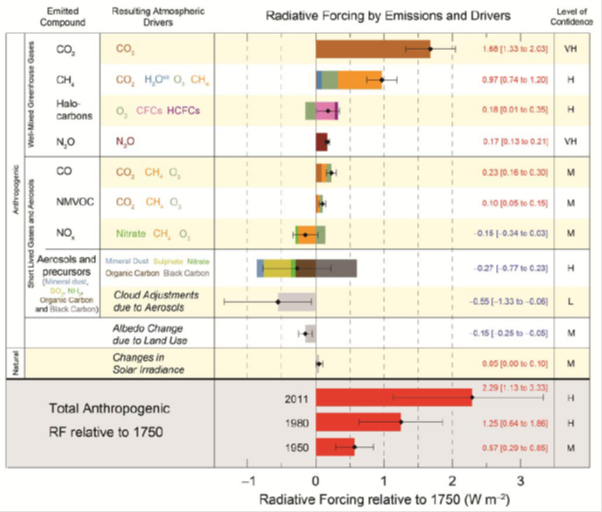IPCC rebuff to the global warming sceptics
There’s been a lot of huffing and puffing from those who’d prefer us to ignore global warming that the record hot year of 1998 hasn’t been exceeded since, hence, apparently, the world is cooling.
The IPCC’s Summary for Policy Makers released on Friday contains a number of rebuffs to the climate contrarians which are nothing really new to those familiar with climate science, but they just don’t seem to have sunk in.
The IPCC said it in the last assessment report in 2007, and they said it again, that warming of the climate system is “unequivocal”. Not just that but “since the 1950s, many of the observed changes are unprecedented over decades to millennia”.
This finding is based on more than one data source. It is seen not just in instrumental record of temperature, or some kind of urban heat island effect, with the report noting:
Has warming stopped?
You don’t have to be a climate scientist to know there’s a lot of variation in the weather not just from day to day, but year to year. With such large variation, to discern a trend you need many years of data.
As a simplistic illustration, imagine you were raving to a workmate about how much warmer it was in Queensland than Melbourne during a recent holiday, and that you’d love to move there for the whole of winter. Then another workmate buts in, saying: ‘Oh, but I was in Brisbane the other day and it was cooler than Melbourne, why would you want to do that?’ You’d probably just politely ignore them.
The IPCC report notes:
...In addition to robust multi-decadal warming, global mean surface temperature exhibits substantial decadal and interannual variability. Due to natural variability, trends based on short records are very sensitive to the beginning and end dates and do not in general reflect long-term climate trends. As one example, the rate of warming over the past 15 years (1998–2012; 0.05 [–0.05 to 0.15] °C per decade), which begins with a strong El Niño, is smaller than the rate calculated since 1951 (1951–2012; 0.12 [0.08 to 0.14] °C per decade).
While the climate contrarians would like you to focus on 1998, if you consider the broader historical context the IPCC finds,
Each of the last three decades has been successively warmer at the Earth’s surface than any preceding decade since 1850. In the Northern Hemisphere, 1983–2012 was likely the warmest 30-year period of the last 1400 years (medium confidence).
In addition to greenhouse gases steadily accumulating and warming the planet, there are other natural factors at play which sometimes act to heat the surface and sometimes cool it. The IPCC note that they suspect with medium level of confidence that some of the warming hiatus is because heat has been redistributed into the ocean and out of the atmosphere. About 90 per cent of the extra energy from greenhouse gases has been absorbed by the ocean, so the circulation of water within the ocean has a big influence. The report also outlines that volcanic eruptions and a downward phase in the 11 year solar cycle have also acted to slightly reduce the amount of solar energy being absorbed by the earth’s surface.
Of course the climate models aren’t perfect by any stretch of the imagination, and several have overestimated the expected warming we saw over the past decade. But the average of the years since 1998 have been the warmest on record. To pluck out the extremely hot El Nino year of 1998 to claim warming has stopped shows an incredible ignorance of statistics 101.
What about that medieval warm period?
In addition to trying to narrow in focus to 1998, the other technique of those who deny global warming is a problem is to claim the instrumental record of temperature stretching back to 1850 is too short. They suggest global warming is not happening or is not a worry because temperatures were as high during the ‘medieval warm period’.
The IPCC assessment report actually acknowledges that there was such a warm period but: “These regional warm periods did not occur as coherently across regions as the warming in the late 20th century (high confidence).”
In other words we are now seeing warming that is widespread across the entire globe, consistent with what you would expect from warming induced by increased greenhouse gases, whereas the medieval warm period was a localised phenomenon peculiar to the North Atlantic.
It’s all to do with the sun
Actually no, the warming has little to do with changes in solar irradiance. The report observes,
There is high confidence that changes in total solar irradiance have not contributed to the increase in global mean surface temperature over the period 1986 to 2008, based on direct satellite measurements of total solar irradiance. There is medium confidence that the 11-year cycle of solar variability influences decadal climate fluctuations in some regions. No robust association between changes in cosmic rays and cloudiness has been identified.
The report provides the illustration below detailing estimates for how much warming or cooling was induced by different climatic drivers. CO2 is by far the biggest influence, adding between 1.33 and 2.03 extra watts of energy per square metre since 1750. The influence of changes in solar irradiance is estimated at the bottom of the diagram. It’s tiny relative to CO2, adding about 0.05 watts.

Source: IPCC Fifth Assessment Report Summary for Policy Makers













